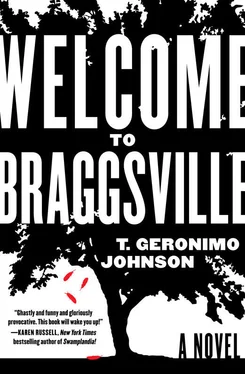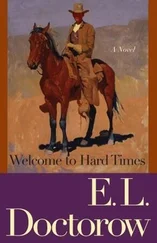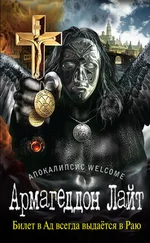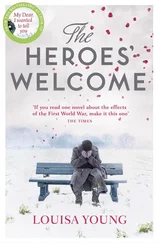Tentatively, Daron approached the Changs, walking along the center aisle swinging wide to avoid surprising them. He looked back at his parents. His father shook his head, but his mother urged him on. As he came to the end of their row, he could see that their attorney was sorting cigarettes that had fallen loose in her purse. Mr. Chang appeared to be praying. He wore in his lapel one red flower, which leaned a little to the left.
Daron wanted to adjust it. Believed that if he could summon the power to do so, all would be forgiven. But he could barely walk. As a wall they stood, Mr. Chang and the blond attorney, who, as Daron approached, pushed up her sunglasses like a visor. It was Mrs. Chang, her face tilted and open. He faltered. Christ, it was hot! Why hadn’t he defied his father and sat beside them? At least in the same row. At least on the same side. Wasn’t his luck plain mean enough already? Was it the privilege of not having to do something that made it a privilege at all? When he was within a few feet of them, close enough to see the deep lines around her eyes, Mrs. Chang extended one finger to shush him and drew her sunglasses back down with the finality of a judge’s sentence, worse yet, another inquest, and this time it was Daron’s death being investigated, and she had found the cause. Like Court, the Changs did not need to say it aloud, either, and they didn’t. So he did. I don’t know why I didn’t say, No. No. No. To all of it. The dots. Ishi. The Veil of Ignorance. This trip. I don’t know why.
I do, replied Mrs. Chang. But, before you ask, it do you no good to hear it from me.
Mrs. Chang, I—
— Daron, I give you advice. Avoid my mother. Avoid the color blue in dreams. Avoid the shade of young trees. Louis’s wishes, not mine.
They retreat, like in a dream because he is powerless to stop or follow. He can only wait to wake up. Once back outside, he is ashamed of how happy he is that his father parked in the shade.
Hirschfield had warned them that there could be a civil suit, though it would take at least a year to build. So Daron assumed the inquest being over meant that things would calm down. But the news coverage increased. Daron had put B-ville on the map all right: every national network devoted at least three minutes daily to summarizing the Incident at Braggsville while showing electronic stills of Daron’s house, or Lou’s Cash-n-Carry Bait Shop and Copy Center (they got a laugh out of that one), or the crowd at the giant poplar, their faces underlit by candles, cheeks glistening, eyes veiled. One station ran a fifteen-minute special on Billie Holiday’s rendition of Abel Meeropol’s poem Strange Fruit, ending the segment with a picture of Old Man Donner’s field, the tree the only spot of color in an otherwise black-and-white image. People even talked to Otis Hunter, mayor of the Gully, whom Sheriff had said he wanted Daron to meet. What Otis had to do with anything Daron couldn’t understand, but several Atlanta stations interviewed him. Otis said only that it was a sad occasion for everyone, that he didn’t blame the children for being born into this world, and that anything he had to say about young Mr. Davenport he would say to his face. Other stations devoted airtime to Louis’s Twitter and Instagram feeds, at least those tweets and Instagram photos marked #ZombieDickSlap. The vigils at the site of the Incident grew in direct proportion to Braggsville’s notoriety. And Braggsville’s notoriety grew.
What was a #ZombieDickSlap? No one knew. Plenty asked, but no one knew. #BraggsvilleDickSlap was another matter. Ask any earthling with Internet access. A legal row over New York’s stop-and-frisk ordinance targeting black and brown teens? A North Carolina sports bar requires minority patrons, and minority patrons only, to purchase memberships? A white woman throws acid on her own face and then files a police report in which she claims to have been attacked by a black woman? James Byrd Jr.? Oscar Grant? A pizza order sent to a black fraternity in care of Toggaf Reggin? Officer Andrew Blomberg acquitted of beating Chad Holley, despite video evidence? #BraggsvilleDickSlap. Unarmed and seated student protesters pepper-sprayed by Berkeley campus police? Tony Arambula? Jose Guerena? Kelly Thomas? John J. McKenna? Kenneth Chamberlain Sr.? Vang Thao? #BraggsvilleDickSlap. Trayvon Martin? Dillon Taylor? Michael Brown?
Photos, too. First a decorated vet with a purple sickle under his eye and a crusty gash in the middle of his lower lip, naked from his jeaned waist, his torso a calico patchwork of tender bruises as numerous as his medals. Next was the woman with a knot on her temple where the arresting officer kicked her in the head (seizures for life). Then the autopsy photos. Then a photo of Louis retouched, and a beret added, so that he resembled the iconic image of Che.
#ZombieDickSlap? Open sesame. Abracadabra. Shave-and-a-haircut-two-bits. Sure, he’d read about police brutality, racism, injustice, written papers, punished classmates with PowerPoints, but at the end of each semester, he’d forgotten all, literally and figuratively. Forgotten, as he’d forgotten about his father being on active duty, forgotten about Quint when he was locked up. Forgetting being just another way of keeping his hands off hot pots. He’d never visited Quint in vo-tech. During the early sprees, he’d been too young. Later, secretly (and foolishly, he knew), Daron feared being trapped inside, due to a riot or a case of mistaken identity. North by Northwest, The Big Lebowski, Galaxy Quest: mistaken identity was the trope in his father’s favorite films. It was in Daron’s mind all too possible to call on Quint as an alien and end up a resident. And that was how he felt now, that he had become an unwitting citizen of a foreign country where human rights atrocities flourished unchecked. What pricked most when he saw that image of Louis — Che Chang! — was not that someone whose username was Gonomad and whose avatar was a vampiric beaver had hijacked his friend’s likeness, but that there were so many others who hadn’t, who had posted pictures and mementos of their own friends. How could there be so many Louis Changs in the world?
They remain late into the summer night, parked under the stars on Gearheart, the new Lover’s Lane. The Davenports watch from their living room window, Mr. Davenport timing his morning departures with the changing of the guard, that moment when one reporter is packed up, but the next not yet unpacked. The culture vultures soon catch on and schedule reporters and cameramen on overlapping shifts. It was two days after the inquest, not even two weeks after the Incident, and a carnival had planted stakes in the street in front of their house.
Call the police? Never. The news vans with their lights, antennae, and fresh faces were a relief, an oasis, an outpost of civilization in the deepest recess of a dangerous wilderness, now encroaching from both sides. Understand, please, that the Nubians arrived first — during screen door season, mind you — drumming with the dusk the morning after the inquest. Sunup an hour away, a black school bus with the eye of Horus emblazoned in gold on its sides and the glittering slogan THE SUN RISES IN AFRICA along the back awakened the Davenports when it came to a halt opposite their driveway, amid the cacophony of crunching brakes and backfiring engine and groaning transmission, and disgorged seventeen men dressed in black robes with gold trim and matching fezzes, men who promptly formed a diamond and performed their sun drum ritual.
Can’t say much about protesters when it ain’t federal land, now can we, mused Sheriff, calling from the car after executing a twenty-point turn. Maybe you should talk to Otis.
Читать дальше
Конец ознакомительного отрывка
Купить книгу












